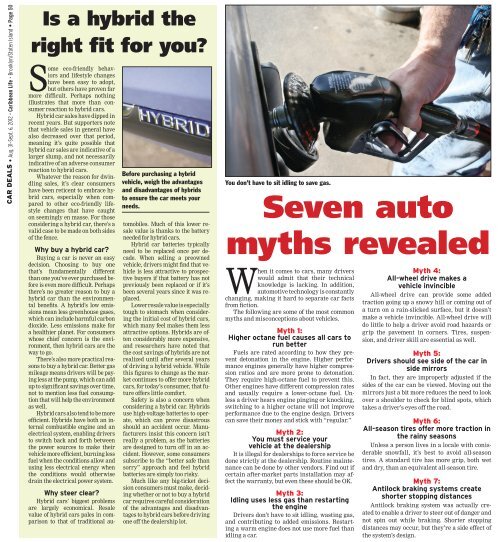Brooklyn print edition (PDF) - Caribbean Life
Brooklyn print edition (PDF) - Caribbean Life
Brooklyn print edition (PDF) - Caribbean Life
Create successful ePaper yourself
Turn your PDF publications into a flip-book with our unique Google optimized e-Paper software.
CAR DEALS Aug. 31–Sept. 6, 2012 • <strong>Caribbean</strong> <strong>Life</strong> • <strong>Brooklyn</strong>/Staten Island Page 50<br />
Is a hybrid the<br />
right fi t for you?<br />
Some eco-friendly behaviors<br />
and lifestyle changes<br />
have been easy to adopt,<br />
but others have proven far<br />
more diffi cult. Perhaps nothing<br />
illustrates that more than consumer<br />
reaction to hybrid cars.<br />
Hybrid car sales have dipped in<br />
recent years. But supporters note<br />
that vehicle sales in general have<br />
also decreased over that period,<br />
meaning it’s quite possible that<br />
hybrid car sales are indicative of a<br />
larger slump, and not necessarily<br />
indicative of an adverse consumer<br />
reaction to hybrid cars.<br />
Whatever the reason for dwindling<br />
sales, it’s clear consumers<br />
have been reticent to embrace hybrid<br />
cars, especially when compared<br />
to other eco-friendly lifestyle<br />
changes that have caught<br />
on seemingly en masse. For those<br />
considering a hybrid car, there’s a<br />
valid case to be made on both sides<br />
of the fence.<br />
Why buy a hybrid car?<br />
Buying a car is never an easy<br />
decision. Choosing to buy one<br />
that’s fundamentally different<br />
than one you’ve ever purchased before<br />
is even more diffi cult. Perhaps<br />
there’s no greater reason to buy a<br />
hybrid car than the environmental<br />
benefi ts. A hybrid’s low emissions<br />
mean less greenhouse gases,<br />
which can include harmful carbon<br />
dioxide. Less emissions make for<br />
a healthier planet. For consumers<br />
whose chief concern is the environment,<br />
then hybrid cars are the<br />
way to go.<br />
There’s also more practical reasons<br />
to buy a hybrid car. Better gas<br />
mileage means drivers will be paying<br />
less at the pump, which can add<br />
up to signifi cant savings over time,<br />
not to mention less fuel consumption<br />
that will help the environment<br />
as well.<br />
Hybrid cars also tend to be more<br />
effi cient. Hybrids have both an internal<br />
combustible engine and an<br />
electrical system, enabling drivers<br />
to switch back and forth between<br />
the power sources to make their<br />
vehicle more effi cient, burning less<br />
fuel when the conditions allow and<br />
using less electrical energy when<br />
the conditions would otherwise<br />
drain the electrical power system.<br />
Why steer clear?<br />
Hybrid cars’ biggest problems<br />
are largely economical. Resale<br />
value of hybrid cars pales in comparison<br />
to that of traditional au-<br />
Before purchasing a hybrid<br />
vehicle, weigh the advantages<br />
and disadvantages of hybrids<br />
to ensure the car meets your<br />
needs.<br />
tomobiles. Much of this lower resale<br />
value is thanks to the battery<br />
needed for hybrid cars.<br />
Hybrid car batteries typically<br />
need to be replaced once per decade.<br />
When selling a preowned<br />
vehicle, drivers might fi nd that vehicle<br />
is less attractive to prospective<br />
buyers if that battery has not<br />
previously been replaced or if it’s<br />
been several years since it was replaced.<br />
Lower resale value is especially<br />
tough to stomach when considering<br />
the initial cost of hybrid cars,<br />
which many feel makes them less<br />
attractive options. Hybrids are often<br />
considerably more expensive,<br />
and researchers have noted that<br />
the cost savings of hybrids are not<br />
realized until after several years<br />
of driving a hybrid vehicle. While<br />
this fi gures to change as the market<br />
continues to offer more hybrid<br />
cars, for today’s consumer, that future<br />
offers little comfort.<br />
Safety is also a concern when<br />
considering a hybrid car. Hybrids<br />
use high-voltage batteries to operate,<br />
which can prove disastrous<br />
should an accident occur. Manufacturers<br />
insist this concern isn’t<br />
really a problem, as the batteries<br />
are designed to turn off in an accident.<br />
However, some consumers<br />
subscribe to the “better safe than<br />
sorry” approach and feel hybrid<br />
batteries are simply too risky.<br />
Much like any big-ticket decision<br />
consumers must make, deciding<br />
whether or not to buy a hybrid<br />
car requires careful consideration<br />
of the advantages and disadvantages<br />
to hybrid cars before driving<br />
one off the dealership lot.<br />
You don’t have to sit idling to save gas.<br />
Seven auto<br />
myths revealed<br />
When it comes to cars, many drivers<br />
would admit that their technical<br />
knowledge is lacking. In addition,<br />
automotive technology is constantly<br />
changing, making it hard to separate car facts<br />
from fi ction.<br />
The following are some of the most common<br />
myths and misconceptions about vehicles.<br />
Myth 1:<br />
Higher octane fuel causes all cars to<br />
run better<br />
Fuels are rated according to how they prevent<br />
detonation in the engine. Higher performance<br />
engines generally have higher compression<br />
ratios and are more prone to detonation.<br />
They require high-octane fuel to prevent this.<br />
Other engines have different compression rates<br />
and usually require a lower-octane fuel. Unless<br />
a driver hears engine pinging or knocking,<br />
switching to a higher octane will not improve<br />
performance due to the engine design. Drivers<br />
can save their money and stick with “regular.”<br />
Myth 2:<br />
You must service your<br />
vehicle at the dealership<br />
It is illegal for dealerships to force service be<br />
done strictly at the dealership. Routine maintenance<br />
can be done by other vendors. Find out if<br />
certain after-market parts installation may affect<br />
the warranty, but even these should be OK.<br />
Myth 3:<br />
Idling uses less gas than restarting<br />
the engine<br />
Drivers don’t have to sit idling, wasting gas,<br />
and contributing to added emissions. Restarting<br />
a warm engine does not use more fuel than<br />
idling a car.<br />
Myth 4:<br />
All-wheel drive makes a<br />
vehicle invincible<br />
All-wheel drive can provide some added<br />
traction going up a snowy hill or coming out of<br />
a turn on a rain-slicked surface, but it doesn’t<br />
make a vehicle invincible. All-wheel drive will<br />
do little to help a driver avoid road hazards or<br />
grip the pavement in corners. Tires, suspension,<br />
and driver skill are essential as well.<br />
Myth 5:<br />
Drivers should see side of the car in<br />
side mirrors<br />
In fact, they are improperly adjusted if the<br />
sides of the car can be viewed. Moving out the<br />
mirrors just a bit more reduces the need to look<br />
over a shoulder to check for blind spots, which<br />
takes a driver’s eyes off the road.<br />
Myth 6:<br />
All-season tires offer more traction in<br />
the rainy seasons<br />
Unless a person lives in a locale with conisderable<br />
snowfall, it’s best to avoid all-season<br />
tires. A standard tire has more grip, both wet<br />
and dry, than an equivalent all-season tire.<br />
Myth 7:<br />
Antilock braking systems create<br />
shorter stopping distances<br />
Antilock braking system was actually created<br />
to enable a driver to steer out of danger and<br />
not spin out while braking. Shorter stopping<br />
distances may occur, but they’re a side effect of<br />
the system’s design.









